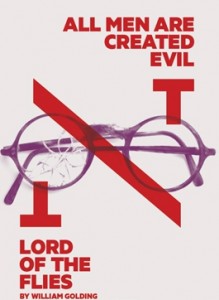Lord of the Flies | New Theatre
- April 24th, 2012
- Posted in Reviews & Responses
- Write comment

Anthony Skuse’s program notes warn us of the loss of innocence. What, when, how do we realise our power and influence in shaping the world? What happens when the falcon cannot hear the falconer? What anchors us when all our leaders are lost? What are we in essense, how long does it take for us to lose all that we know and have developed?
Turning and turning in the widening gyre
The falcon cannot hear the falconer;
Things fall apart; the centre cannot hold;
Mere anarchy is loosed upon the world,
The blood-dimmed tide is loosed, and everywhere
The ceremony of innocence is drowned
The best lack all conviction, while the worst
Are full of passionate intensity.
– W.B Yeats
School boys. Those mini-gentlemen in boaters. White knobbly knees. Lace-up shoes. Rounded vowels. Within the unifying uniforms is something raw and instinctual. Something that is smothered, ordered, ranked, assessed, subdued. Primal urges? Survival instinct? Power? Control? Violence?
The novel by William Golding (now informative torture for teenagers sitting through the HSC) was my childhood bedtime reading and I must admit to being forever haunted by the refrains and the images within the book. I always tentatively edge towards adaptations of novels. The novel itself is such a distinct and intimate artform and the cover of a book opened like butterfly wings, slowly flaps in my lap with each turn of a page… my eyes and mind determining the pace of the story… sometimes my pauses in the flow of the story are dictated via chapters – sometimes through life’s incidental interruptions. Sometimes my eyes perform an accidental glissando as I read through a line too quickly, and the guilt/fear of having missed a vital plot point makes me stop and revisit the line.
In the theatre, the experience of story reception is completely different – this is a public act where in multiple voices, multiple movements simultaneously collide and clash in one space at one time. The story is told visually, aurally. The director provides us with a very particular reading… perhaps a personal reading.
There is a gentle sound and a spray of light on an angled stage, large white heads bob and nestle as frail bodies scuttle and shuffle about in uniforms. Faces without detail or distinction clean and huge. The image of childhood is simple. Powerful.
The island where a plane of school boys has crashed, is reduced to a raked beige surface -no need for literal sand – Light (Sara Swersky )does the work to indicate time, fire, and atmosphere. This is a story about minimalism – about the bare necessities required for survival, and this is beautifully echoed in design. Simple, well utilized and a perfect parallel to the story. The boys are starting from scratch – arranging themselves, their priorities – to survive or to be rescued? Soon the formalities slip, soon the systems they put in place dissolve.
Anthony Skuse is a master of unruly ensemble. The boys are controlled chaos, in the best possible sense. Kyle Bush, Douglas Cairns, Tom Christophersen, Judd English, Tom Gilmour, Stephen Lloyd-Coombs, Adam Marks, Christopher Peterson, Seton Pollock, Samuel Rushton, Andrew Ryan all filling their roles with the fever of survival and injustice. Skuse has found the rhythm and pulse of each scene and the free range actors surprise and engage. Some fascinating character moments – from Simon and Jack in particular – but wild-eyed ex-choristers also buoy each scene with surprising flair and brave choices. Not all the work is even, but the intent is strong from all. What we are left with is bloody, muddy mess – torn and frayed clothes – torn and frayed rules.
This is a truly sophisticated and well considered production, one which is sure to rival the haunting affect of the novel.
That’s a very good read….I really will be able to retire soon xxx
I love that you write about theatre and art instread of just describing the plot. You should be writing for the SMH. And I love that you got the marks – so many don’t. xt
Thanks James, No you can’t retire, not yet… not without a linen suit and a summer cottage that I can escape to… plus… I need to to tell me when I get it VERY wrong/misunderstand something. XXX
Thanks Troy, for your kind words. I always aim to add something to the field – even if it is the smallest squeak of a paragraph that says “I saw, I understand, I liked this.” This piece was a rare and invigorating production… and caught me by surprise and I love that.